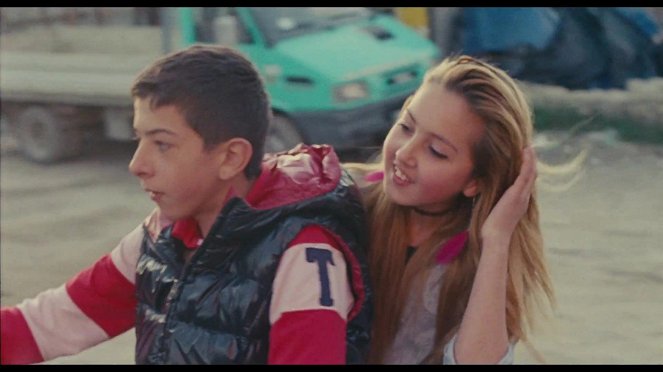Réalisation:
Jonas CarpignanoScénario:
Jonas CarpignanoPhotographie:
Tim CurtinMusique:
Dan RomerActeurs·trices:
Pio Amato, Koudous Seihon, Damiano Amato, Iolanda Amato, Patrizia Amato, Susanna Amato, Rocco Amato, Francesco Pio Amato, Damiano Nicolas Amato (plus)Résumés(1)
Pio a 14 ans et veut grandir vite. Comme son grand frère Cosimo, il boit, fume et apprend l'art des petites arnaques de la rue. Alors le jour où Cosimo n'est plus en mesure de veiller sur la famille, Pio va devoir prendre sa place. Mais ce rôle trop grand pour lui va vite le dépasser et le mettre face à un choix impossible. (Haut et Court)
(plus)Vidéo (3)
Critiques (2)
Moins attrayante pour le public, mais tout aussi précieuse en termes de narration, cette version de la Cité des dieux est située dans la communauté rom en Calabre. Il n'y a pas de fusillades, elle adopte une forme modeste, mais le trouble et la lutte intérieure d'un jeune garçon sur son intégration sociale se ressentent physiquement. Grâce à une mise en scène de qualité, un environnement réaliste et des acteurs non professionnels motivés. Le début du générique de fin avec leurs noms est le point culminant du film.
()
A Ciambra, one of the most compelling Italian films of recent years, takes place in the Romani community in Calabria and obverses the adolescence of young Pio, who appeared in two of the director’s previous films (one of which was a short version of A Ciambra). Carpignano wrote the screenplay on the basis of interviews with the lead actor and other, non-professional actors, whose world he depicts in the least distorted way possible and with whom he spent a relatively long time before the actual filming to order to gain their trust (among other things, he relocated to Calabria and adopted the local dialect). Thanks to that, the film is not an aloof anthropological study, but rather a view of the world through the eyes of characters, to whose rhythm of life the camera movement, or rather the rhythm of the narrative, is also adapted. Unlike a number of other veristic festival dramas, A Ciambra is a narratively masterful and extraordinarily dynamic film that shows that the legacy of neorealism is still (or again?) very much alive in Italy. Carpignano decidedly ranks among the emerging talents of Italian cinema who are worth keeping an eye on. 75%
()



Annonces